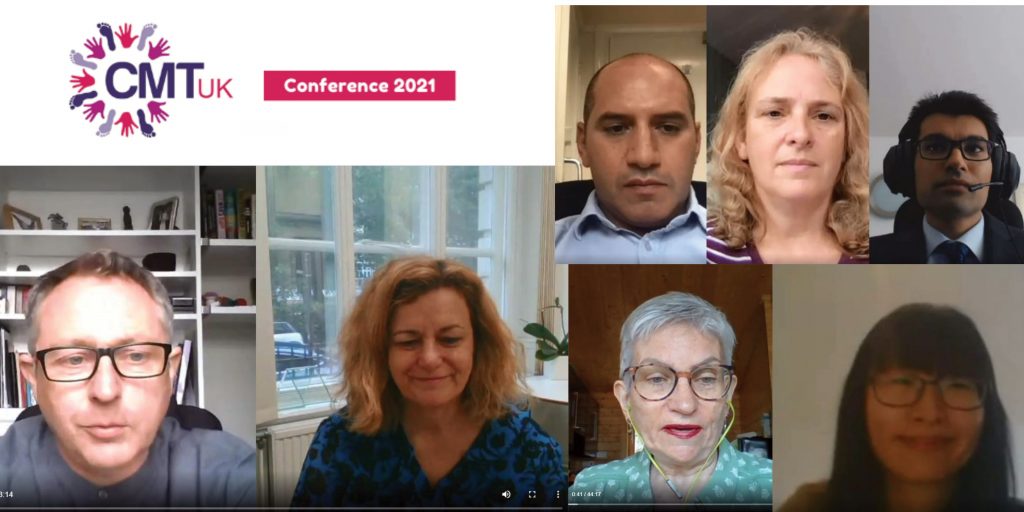CMT UK is a UK charity, working to support those who are affected by Charcot-Marie-Tooth disease. This year, the charity organised its first virtual annual conference, open to everyone interested in CMT including CMT UK members, non-members and medical professionals. The conference attracted a high number of attendees from the UK, as well as from overseas. Speakers shared the latest knowledge, research and findings in the field of CMT disease. Highlights of this year’s programme are outlined below.
Day 1
After an introduction and welcome from Paul Fleming, Chair of the Board and Simon Bull, CEO of CMT UK, Imelda Hughes (Consultant Paediatric Neurologist at Royal Manchester Children’s Hospital) gave a talk about CMT in children.
Imelda shared the symptoms and characteristic features many experience, and described ways in which to manage it.This included areas such as diet, physical activity, developing hobbies, and keeping up with routine child immunisations and dental health. Imelda went on to talk about the considerations for the prevention or limitation of CMT, including use of splinting, stretching, serial casting or possible surgery. Imelda went on to say that although there are challenges with CMT in children, there are also opportunities to lay foundations for a better adult life with participation and lifestyle choices.
Wendy Foo, Occupational Therapist at Royal Manchester Children’s Hospital talked about unlocking the potential of children and young people with CMT and explained how OT is not just about helping with equipment. In children, OTs concentrate on self-care, productivity and leisure. Wendy went on to say that early intervention is key and increasing awareness of CMT is very important. Wendy discussed many practical ideas to help with everyday life, play and leisure, at school and preparing for adulthood.
Karin Rodgers, a CMT UK Trustee who runs ‘CMT Kids’, gave an update on the various activities and get-togethers she organises. These include CMT Kids Weekends and weekly zoom quizzes during lockdown, which help children living with CMT to feel less alone, more included and more confident. CMT Kids is also planning a second overseas trip (dependent on government guidelines) to New Zealand or Australia and they are currently fundraising to help make this possible.
The conference’s sponsors, Dorset Orthopaedic, TalarMade, ShoeMed and Special Kids Company then shared their CMT-relevant services and products and answered many questions from attendees.

Day 2
Mary Reilly is Professor of Neurology at UCL Queen Square Institute of Neurology and patron of CMT UK, and has just been made Vice Chair of International CMT and Related Disorders. Mary gave an update on CMT diagnosis and treatments in the UK. She described how in 2017, there were 155 complex neuropathies; now there are over 200. She also mentioned that 2021 is the 30th anniversary of finding the first gene (CMT1A); there are now over 100 genes. In the last 5-6 years, sequential gene testing is no longer done (except for chromosome 17); instead big groups of genes are tested together, which makes diagnosis time much quicker (6 weeks) with a diagnosis rate of 73%. Last year, her team put together a guide to help physicians in interpreting genetic results and advised that the same test is now available in all genetic laboratories for patients. As new genes are being found all the time, Mary suggested that it is worth patients with inconclusive results to ask their Consultants to re-check them again every 2-3 years. Mary also went on to say that there are gene modifying treatments at pre-clinical studies stage currently ongoing.
Marina Kennerson, Professor of Neurogenetics /Neurosciences, ANZAC Research Institute and Sydney Medical School, talked about how DNA can contribute to CMT. She leads a team working with gene discovery and a translational genomics programme. She described how research using new technology, such as next generation sequencing, has facilitated CMT gene discovery and has revolutionised the CMT research space and finding new genes. The research is helping to find gene mutations and potentially find gene therapies. She went on to describe the research happening in their lab and what they are doing to solve some forms of CMT.
Debbie Delves, Podiatrist and CMT UK Trustee, heads up the research committee, which initiates, co-ordinates, promotes and supports research into CMT and its effects. The committee this year awarded a grant to Matt Welck and his team at the National Orthopaedic NHS Trust for their work on the use of Artificial Intelligence in defining forefoot deformity in complex pes cavovarus feet in CMT disease and hence predicting surgical outcomes. Matt and Karan Malhotra went on to describe how the grant has been used towards software for the 3D imaging of bones and axes, as well as a high spec computer that runs the software. This will help to define deformity better, monitor progression, help to plan surgery and demonstrate improved outcomes. Matt Welck, Consultant Orthopaedic Foot & Ankle Surgeon, said “We believe the software will revolutionise the understanding and treatment of complex foot deformity in the CMT foot.” The committee also launched the ‘school award’ this year, helping to raise awareness of CMT and engaging the next generation of potential researchers.
In summary, the conference provided attendees with the latest findings and updates on CMT from prominent CMT authorities from the UK and Australia. The format also enabled attendees to ask each of the speakers questions at the end of their sessions.
For more information on the charity CMT UK or to become a member, go to cmt.org.uk. To request a free health professional information pack today, please do contact us – we are here to help.